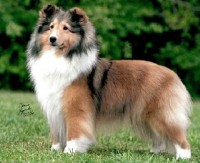Go to:Adult Dogs
Go to:Senior Dogs
Puppies
During your puppy’s wellness visits we will:
- Provide a complete physical examination to uncover potential problems.
- Perform an intestinal parasite exam and treat as indicated.
- Administer necessary vaccines.
- Provide information regarding diet, training, exercise, and behavior issues.
- Answer your questions.
Vaccinations
Puppies require a series of vaccinations to ensure they have adequate immunity against common diseases. Completing these vaccinations properly is critical to protect your new puppy against life threatening diseases such as canine parvovirus.
Puppies receive the following vaccinations:
Da2PP (Distemper, Parvo, Parainfluenza, Hepatitis) – also called a “combo” shot. To be given for the first time when the puppy is 7 to 8 weeks old. After that the vaccine should be repeated every 3-4 weeks until the puppy is 16 weeks old. The total number of vaccinations the puppy will receive will vary depending on the age of the puppy at the first vaccination and length of time between boosters. The doctor will customize your puppy’s vaccine schedule depending on various factors.
Bordetella (kennel cough) – To be given one time at any age.
Leptospirosis -To be given twice, 3 to 4 weeks apart, generally on the second and third visits. Not every puppy will receive this vaccination, need will be determined by risk factors.
Rabies vaccination– To be given once when the puppy is 16 weeks old, or older.
About 1 year after the puppy finishes this series of vaccinations it will be time to booster all of the vaccinations. Then the Da2PP will be given two years after that, then every third year. Rabies will be given every third year. Bordetella and Leptospirosis will continue to be given annually.
Parasite prevention
All puppies should be dewormed at least once and they need to be started on heartworm preventive and stay on it year round for life. Flea and tick treatments and preventives should also to be given as needed. There are many options for heartworm and flea and tick control – we can find a product or combination of products to suit every need!
Follow the link to go to our page on the parasite prevention products we offer.
Nutrition
Choosing a dog food can be a little overwhelming, with dozens of brands and hundreds of different formulas available. There is no one food that is best for every puppy or dog. Many excellent brands are for “all life stages” meaning there will not be a separate puppy formula. Other brands still divide their foods into puppy, adult and senior formulas. Your best bet is to pick a popular, high quality food and see how your puppy does on it. Some brands that tend to perform well are Iams, Eukanuba, Nutro, Purina, Royal Canin, Taste of the Wild, Natural Balance and Wellness.
Most puppies should be fed three times a day until they are about four months old, then they can be fed twice daily. Toy breed puppies like Chihuahuas and Yorkies should have food available at all times or be fed many small meals a day to ensure they do not develop low blood sugar.
Click here for an article on dog food
Click here for a list of foods that are not safe for dogs
Grooming
If your puppy is a breed that will require grooming, be sure to start getting him used to being handled and groomed at an early age. You can run a blow dryer near him while petting him and giving him treats, and also gently handle his feet and head. Bathe him every few weeks to make sure he gets used to the process while he is small enough to handle easily. Keep everything fun by taking it slow, keeping calm and rewarding good behavior with praise and treats. Your future groomer will thank you!
Now is also a good time to start brushing teeth, or using an oral dental rinse. One word of advice, when puppies are teething it is best to stay out of their mouths- they can be quite sore and you do not want them associating teething pain with having their teeth brushed. Puppies are generally teething around 3-6 months of age.
For an excellent library of articles on puppy care, raising and training, visit http://www.ddfl.org/education/dog-behavior-tips
Adult Dogs
During your adult dog’s yearly wellness visit we will:
- Provide a complete physical examination to uncover potential problems.
- Perform an intestinal parasite exam and treat as needed.
- Perform a heartworm and tickborne disease screening test.
- Administer necessary vaccines.
- Provide information regarding diet, training, exercise, and behavior issues.
- Answer your questions.
Vaccinations
Dogs receive the following vaccinations:
Da2PP (Distemper, Parvo, Parainfluenza, Hepatitis) – also called a “combo” shot. Once a dog has completed the puppy vaccination series they receive this vaccine a year later, then 2 years after that, then every third year thereafter.
Bordetella (kennel cough) – given annually.
Leptospirosis -Given annually. Not every dog will receive this vaccination, need will be determined by risk factors.
Rabies vaccination– Given at 16 weeks, boostered a year later, then given every third year.
Parasite prevention
Dewormer can be given as needed to adult dogs. Generally speaking if the dog is on heartworm preventive they should not get intestinal worms either. The exception to this is tapeworms, which they get from fleas. The heartworm preventives do not treat for tapeworms, so a separate dewormer needs to be given to dogs with tapeworms.
All dogs should stay on heartworm preventive year round in this area. Heartworms are spread by mosquitoes, and it only takes one bite from an infected mosquito to infect your dog. We have mosquito activity during warm periods even in the winter months, and mosquitoes can definitely get into your home, so all dogs should be in preventive even if they are mostly indoors.
Flea and tick treatments and preventives should also to be given as needed. Fleas can cause flea allergy dermatitis and make your dog miserable, cause anemia and infect them with tapeworms. Ticks can cause infected bites and spread tickborne diseases. There are many options for heartworm and flea and tick control – we can find a product or combination of products to suit every need!
Follow the link to go to our page on the parasite prevention products we offer.
Nutrition
Choosing a dog food can be a little overwhelming, with dozens of brands and hundreds of different formulas available. There is no one food that is best for every dog. Your best bet is to pick a popular, high quality food and see how your dog does on it. Some brands that tend to perform well are Iams, Eukanuba, Nutro, Purina, Royal Canin, Taste of the Wild, Natural Balance and Wellness. Click here for an article on dog food
Also be sure to not overfeed your dog – obesity is a major problem in pet dogs, and being overweight can lead to diabetes, arthritis and orthopedic problems. Don’t be afraid to feed less than the dog food label advises, most manufacturers estimate on the high side! If your dog is overweight we can help you make a plan to take the pounds of safely.
Click here for a list of foods that are not safe for dogs
Dental Care
It is very important to maintain your adult dog’s dental health.
We recommend using a plaque prevention product — a rinse that you apply to your dog’s teeth and gums several times a week, or even daily. The product kills bacteria and prevents the formation of plaque and tartar.
Just as in people, daily brushing can help remove food particles from between your dog’s teeth. You can use a child’s toothbrush or purchase a brush from your veterinarian. Human toothpastes should be avoided because they contain ingredients that should not be swallowed by your pet. Your dog should like the taste of pet toothpaste, which is available in flavors such as vanilla.
Several dental diets and treats can also help keep plaque and tartar to a minimum. The diets tend to have larger kibbles to provide abrasive action against the tooth surface when chewed. Or they may contain ingredients that help prevent tartar mineralization. Ask us which diets or treats are appropriate for your pet.
Many dogs need to have their teeth professionally cleaned at least once a year. Please see our page on dentistry.
Grooming
If your dog is a breed that requires grooming, be sure to keep up with regular bathing, brushing or haircuts. Matted hair can hide parasites, lead to skin infections and make the dog uncomfortable. Excessive hair around the eyes or ears can lead to infections in those areas. Long nails can cause the feet to splay and are prone to snagging and breaking.
Contact a professional groomer for advice on how to best keep up with your dog’s grooming needs. We do baths and brush-outs at the clinic, but will refer you to a groomer if you have a breed that requires trimming.
For an excellent library of articles on dog care, raising and training, visit http://www.ddfl.org/education/dog-behavior-tips
Senior Dogs
During your senior dog’s wellness visit we will:
- Provide a complete physical examination to uncover potential problems.
- Discuss recommendations for senior blood work or other tests.
- Perform an intestinal parasite exam and treat as needed.
- Perform a heartworm and tickborne disease screening test.
- Administer necessary vaccines.
- Provide information regarding diet, training, exercise, and behavior issues.
- Answer your questions.
Senior issues
Like people, dogs are living longer. We all cherish the companionship with our canine friends. It is important that we help ensure these extended years are the happiest and healthiest possible. Working with us, you can make a significant difference in the life of your senior dog.
As dogs move into the senior phase of life, they experience changes that are very similar to aging humans. Diseases and conditions that are commonly known to affect older people also affect our canine companions: kidney, heart and liver disease, tumors, cancer, diabetes, depression, arthritis, thyroid conditions, hormonal problems, neuroses and loss of sensory perception.
Age is never just a number but rather a measure of the effect of aging to the body. Variables such as genetics, nutrition and environment all contribute to how your dog will be influenced by the aging process. Dogs are considered seniors anywhere between six and eleven years, depending on size and breed type.
Regular exams and labwork can help us to to detect and slow the onset or progress of conditions such as kidney or liver disease, arthritis, diabetes, Cushing’s disease and others. We recommend that healthy senior dogs and cats visit the veterinarian every six months for a complete exam and laboratory testing. Keep in mind that every year for a dog or cat is equivalent to 5–7 human years. In order stay current with your senior pet’s health care, twice-a-year exams are a must. During the senior health exam, your veterinarian will ask you a series of questions regarding any changes in your pet’s activity and behavior. Click here for an article on senior pet care.
Nutrition
Senior dogs generally require fewer calories than they did when they were younger, but should still receive adequate amounts of high quality protein to maintain their muscle mass. Some senior dogs may need to go on a special diet to help treat or control health issues such as kidney or liver disease.
Choosing a dog food can be a little overwhelming, with dozens of brands and hundreds of different formulas available. There is no one food that is best for every dog. Your best bet is to pick a popular, high quality food and see how your dog does on it. Some brands that tend to perform well are Iams, Eukanuba, Nutro, Purina, Royal Canin, Taste of the Wild, Natural Balance and Wellness. Click here for an article on dog food
Click here for a list of foods that are not safe for dogs
Also be sure to not overfeed your dog – obesity is a major problem in pet dogs, and being overweight can lead to diabetes, arthritis and orthopedic problems. Don’t be afraid to feed less than the dog food label advises, most manufacturers estimate on the high side! If your dog is overweight we can help you make a plan to take the pounds of safely.
Dental Care
It is very important to maintain your senior dog’s dental health.
We recommend using a plaque prevention product — a rinse that you apply to your dog’s teeth and gums several times a week, or even daily. The product kills bacteria and prevents the formation of plaque and tartar.
Just as in people, daily brushing can help remove food particles from between your dog’s teeth. You can use a child’s toothbrush or purchase a brush from your veterinarian. Human toothpastes should be avoided because they contain ingredients that should not be swallowed by your pet. Your dog should like the taste of pet toothpaste, which is available in flavors such as vanilla.
Several dental diets and treats can also help keep plaque and tartar to a minimum. The diets tend to have larger kibbles to provide abrasive action against the tooth surface when chewed. Or they may contain ingredients that help prevent tartar mineralization. Ask us which diets or treats are appropriate for your pet.
Many dogs need to have their teeth professionally cleaned at least once a year. Please see our page on dentistry.
Grooming
If your dog is a breed that requires grooming, be sure to keep up with regular bathing, brushing and haircuts. Matted hair can hide parasites, lead to skin infections and make the dog uncomfortable. Excessive hair around the eyes or ears can lead to infections in those areas. Long nails can cause the feet to splay and are prone to snagging and breaking.
Contact a professional groomer for advice on how to best keep up with your dog’s grooming needs. We do baths and brush-outs at the clinic, but will refer you to a groomer if you have a breed that requires trimming.
For an excellent library of articles on dog care, raising and training, visit http://www.ddfl.org/education/dog-behavior-tips
Vaccinations
Dogs receive the following vaccinations:
Da2PP (Distemper, Parvo, Parainfluenza, Hepatitis) – also called a “combo” shot. Given every third year to adult dogs.
Bordetella (kennel cough) – given annually.
Leptospirosis -Given annually. Not every dog will receive this vaccination, need will be determined by risk factors.
Rabies vaccination– Given every third year to adult dogs.
Parasite prevention
Dewormer can be given as needed to adult dogs. Generally speaking if the dog is on heartworm preventive they should not get intestinal worms either. The exception to this is tapeworms, which they get from fleas. The heartworm preventives do not treat for tapeworms, so a separate dewormer needs to be given to dogs with tapeworms.
All dogs should stay on heartworm preventive year round in this area. Heartworms are spread by mosquitoes, and it only takes one bite from an infected mosquito to infect your dog. We have mosquito activity during warm periods even in the winter months, and mosquitoes can definitely get into your home, so all dogs should be in preventive even if they are mostly indoors.
Flea and tick treatments and preventives should also to be given as needed. Fleas can cause flea allergy dermatitis and make your dog miserable, cause anemia and infect them with tapeworms. Ticks can cause infected bites and spread tickborne diseases. There are many options for heartworm and flea and tick control – we can find a product or combination of products to suit every need!
Follow the link to go to our page on the parasite prevention products we offer.
For an excellent library of articles on dog care, raising and training, visit http://www.ddfl.org/education/dog-behavior-tips








